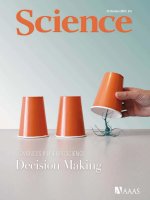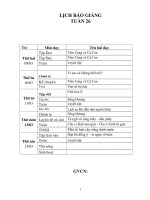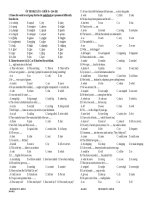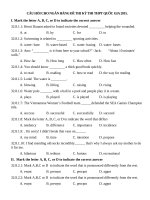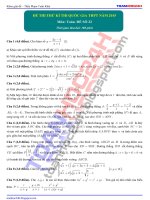Tvefile 2015 10 26 1628927054
Bạn đang xem bản rút gọn của tài liệu. Xem và tải ngay bản đầy đủ của tài liệu tại đây (545.91 KB, 15 trang )
THE INCLUSION OF MULTICULTURAL LITERARY TEXTS FROM THE U.S.
WITH THE TEACHING OF ENGLISH AS A FOREIGN LANGUAGE:
A PEDAGOGICAL CONVERGENCE TO FOSTER
EFL LEARNERS’ INTERCULTURAL
COMPETENCE
LUIS FERNANDO GOMEZ RODRIGUEZ
A Dissertation Submitted in Partial
Fulfillment of the Requirements
for the Degree of
DOCTOR OF PHILOSOPHY
Department of English
ILLINOIS STATE UNIVERSITY
2012
UMI Number: 3538804
All rights reserved
INFORMATION TO ALL USERS
The quality of this reproduction is dependent upon the quality of the copy submitted.
In the unlikely event that the author did not send a complete manuscript
and there are missing pages, these will be noted. Also, if material had to be removed,
a note will indicate the deletion.
UMI 3538804
Published by ProQuest LLC 2013. Copyright in the Dissertation held by the Author.
Microform Edition © ProQuest LLC.
All rights reserved. This work is protected against
unauthorized copying under Title 17, United States Code.
ProQuest LLC
789 East Eisenhower Parkway
P.O. Box 1346
Ann Arbor, Ml 48106-1346
THE INCLUSION OF MULTICULTURAL LITERARY TEXTS FROM THE U.S.
WITH THE TEACHING OF ENGLISH AS A FOREIGN LANGUAGE:
A PEDAGOGICAL CONVERGENCE TO FOSTER
EFL LEARNERS’ INTERCULTURAL
COMPETENCE
LUIS FERNANDO GOMEZ RODRIGUEZ
DISSERTATION APPROVED:
Date
Kristin Dykstra, Chair
Date
Paula Ressler
Date
Lisya Seloni
© 2012 Luis Fernando Gomez Rodriguez
THE INCLUSION OF MULTICULTURAL LITERARY TEXTS FROM THE U.S.
WITH THE TEACHING OF ENGLISH AS A FOREIGN LANGUAGE:
A PEDAGOGICAL CONVERGENCE TO FOSTER
EFL LEARNERS’ INTERCULTURAL
COMPETENCE
Luis Fernando Gomez Rodriguez
363 Pages
December 2012
Employing case study research in an EFL classroom o f the language program at a
university in Bogota, Colombia in 2010, the dissertation shows how EFL learners were
guided to read multicultural literary short stories to develop intercultural competence
through several teaching approaches.
Chapter one presents the constructs involved in the study, which support the need to
promote intercultural competence in the EFL context through culturally diverse literature.
Chapter two explores the theoretical concepts of intercultural competence as regarded
by the areas o f multicultural literature and EFL teaching.
Chapter three establishes the relationship between multicultural competence and
multicultural rubrics for the study of literature, and it describes educational goals often
associated with the teaching of multicultural literature of the U.S., as well as their
application to EFL instruction.
Chapter four discusses teaching approaches to multicultural literature used in U.S.
classrooms and proposes their application in the EFL context. It argues that the teaching
of multicultural literary texts in EFL should be supported by appropriate teaching
approaches that can provide learners with the chance to negotiate meaning and construct
intercultural knowledge.
Chapter five examines the pedagogical value, literary analysis, and multicultural
meaning o f literary samples that were selected for the teaching of multicultural literature
from the United States in a Colombian EFL classroom.
Chapter six describes a class in which U. S. multicultural was taught in an EFL
classroom in Bogota, Colombia in 2010. It describes the research type and the research
methodology involved in the pedagogical experience to determine how EFL learners
fostered intercultural competence.
Chapter seven presents the qualitative analysis of the data gathered from the
participants and observations during the pedagogical case study and the research findings.
The final section relates the objectives achieved, the final considerations, and the
conclusions of the study during this research procedure.
ACKNOWLEDGEMENTS
There are many people whom I want to thank.
I am heartily thankful to my dissertation director, Doctor Kristin Dykstra, whose
encouragement, guidance, and support from the preliminary to the concluding level of
this study enabled me to develop deep understanding of the research procedure. Not only
her professional scholarship, but her humanitarian qualities motivated me to work on this
important project, which has become a meaningful document for my teaching career.
I am also endlessly grateful to Doctor Lisya Seloni who helped me to improve my
arguments in the TESOL area, Doctor Paula Ressler who assisted me with important
pedagogical insights, Doctor Susan Burt whose seminar and tutorial sessions provided me
with significant aspects to focus my research thoroughly, and Doctor Cynthia Huff who
was a very important person during my internship in Bogota, Colombia, and who visited
my home university to supervise my pedagogical research. All of them read the study and
contributed with insightful remarks to guide my research.
I also want to thank to the Department of English at Illinois State University,
Universidad Pedagogica Nacional de Colombia, and the Fulbright Commission for
having given me the great opportunity to do my doctoral studies in the USA.
I am equally grateful with my dearest American friends Phil and Diane Tetley who
supported me during my stay in the USA, and who especially took care of me when I was
sick. I also want to express my gratitude to my dear family: my mother, my four sisters
i
and my grandma who were a strong emotional support during my studies far away from
home, and my friends and coworkers Esperanza Vera and Bertha Osorio who encouraged
me to engage in a doctoral program in the USA.
Lastly, I offer my regards and blessings to all of those who supported me in any
respect during the completion of the project.
L. F. G. R
ii
CONTENTS
Page
ACKNOWLEDGEMENTS
i
CONTENTS
iii
TABLES
viii
FIGURES
ix
CHAPTERS
I.
CONSTRUCTS FOR CONNECTING INTERCULTURAL AND
MULTICULTURAL COMPETENCE IN THE EFL CLASSROOM,
USING CULTURALLY DIVERSE LITERATURES
Introduction and Contextualization of the Interdisciplinary Study
Type of Study: Qualitative Case Study
Theoretical Constructs of the Study
EFL Learners
Concept of Authentic Texts in the EFL Area and Authentic Literary
Texts in the Field of Literature
Intercultural and Multicultural Communicative Competence
Towards a Definition of Multicultural Literature
Statement of the Problem: Current Limitations in EFL Teaching
and Learning
II.
TOWARD UNDERSTANDING THE CONCEPTS OF
INTERCULTURAL AND MULTICULTURAL COMMUNICATIVE
COMPETENCE
Views o f Culture and Interculturality
Views of Intercultural and Multicultural Competence
The Development of Intercultural Competence in the United
States: A Historical Synopsis
The Development of Intercultural and Multicultural Communicative
Competence in the EFL Context
Byram’s Model of Intercultural Communicative Competence and its
Relation to Other Authors’ Contributions to its Definition
iii
1
1
11
12
14
14
21
22
23
31
32
40
45
65
73
I.
INCORPORATING MULTICULTURAL LITERATURE IN THE
LANGUAGE CLASSROOM
U.S. Multicultural Literature in Higher Education Today
Educational Goals/ Objectives of Multicultural Literature
Articulated in the U.S. Academy
The Inclusion o f Literature in the Language Classroom:
Opponents and Proponents
Theory and Practice in the Use of Literary Texts in the EFL
Classroom: An Emphasis on the “Mainstream”
Theoretical Perspectives for the Inclusion of Literature in EFL
Existing Case Studies and Action Research Studies about the
Teaching of Literature in EFL
II.
III.
APPLYING TEACHING APPROACHES TO MULTICULTURAL
LITERATURE IN EFL
85
85
95
98
102
105
111
122
Equity Pedagogy and Approaches to Equity Pedagogy
Contextualization of Contact Zones
Engagement of Debate and Conflict in the Classroom
The practice o f “Historicizing”
Relational Teaching
Socio-constructivist Pedagogy
Inquiry-based Approach
Dialogic Approach
Content-based Approach
125
127
131
136
139
143
145
147
152
CRITERION FOR THE APPROPRIATE SELECTION OF
MULTICULTURAL LITERARY TEXTS IN THE EFL
CONTEXT AND THEIR LITERARY VALUE
156
Criterion for Selection of Literary Works
Literary Value of the Multicultural Selections Chosen for this Study
First Selection of U.S Latino/a Literature: Sandra Cisneros’s
“Eleven”
Second Section of U.S. Latino/a Literature: Sandra Cisneros’s
“Woman Hollering Creek”
A selection o f Puerto Rican Literature: Emilio Diaz Valcarcel’s
“Grandma’s Wake”
A selection of Jewish-American Literature: Bernard Malamud’s
“The First Seven Years”
First Selection of African-American Literature: Alice Walker’s
“Everyday Use”
Second Selection of African-American Literature: Dick Gregory’s
“Shame”
iv
156
160
161
168
182
194
202
212
VI.
PEDAGOGICAL INTERVENTION AND RESEARCH DESIGN:
THE TEACHING OF MULTICULTURAL LITERATURE IN
AN EFL CLASSROOM IN COLOMBIA, SOUTH AMERICA:
A CASE STUDY
Research Design
Research Inquiry
Context of the Study
Setting
The Role of the Language Department of UPN in the Colombian
Setting
Second Language Teaching Approaches Used in the Language
Department
Description of an American Literature Course at UPN
Participants
Methodology for the Study
Phase One: The Description of the Pedagogical Intervention
Phase Two: Procedure Carried out for the Data Collection during
the Pedagogical Case Study (Internship)
Direct Observation (Field Notes)
In-depth Interviewing
Students’ Journals
Students’ Literary Response Papers
VII.
DATA ANALYSIS: TEACHING MULTICULTURAL LITERATURE
IN AN EFL CLASSROOM AT UPN, COLOMBIA, SOUTH
AMERICA
219
219
220
222
222
225
226
228
229
231
231
255
256
257
258
260
262
Data Coding Process and Grounded Approach Analysis
Findings with Respect to UPN Students’ Intercultural
Communicative Competence Development
262
Themes Related to the Aspect of Knowledge
267
266
The History of the U.S. Can Be Studied through Multicultural
Literary Texts when Historicizing
267
The Literary Texts Depict Unequal Social Differences and
Gender Roles in Both Social and Family Settings through
the Characters’ Interactions
272
The Multicultural Literary Texts Provide the Means to
Identify and to Learn about Important Traditions and
Customs Involving Diverse Ethnic Backgrounds
278
v
Themes Related to the Knowledge of Language
The Literary Readings Facilitate the Construction of New
Vocabulary in Context
The Multicultural Literary Pieces Contribute to Enhance
Grammatical Competence
Themes Related to the Aspect of Skills
Questions and Class Discussion Allow Learners to Discover
and Explore Ideas/Content Reflected in the Multicultural
Readings (Skills o f Discovery)
Learners were Able to Interpret Cultural, Literary, and Other
Kinds of Content when Reading Multicultural Texts (Skill
of Interpreting)
Learners were Able to Compare Cross-cultural, Literary, and
Other Kinds of Content when Reading Multicultural Texts
(Skill of Comparing)
The Multicultural Pieces and the Study Guides Promoted the
Development of the Reading Skills
The Multicultural Literary Selections Engage Students in the
Practice of the Speaking Skill in English
Literary Texts Allow Students to Think Critically and to
Defend a Point of View (Critical Thinking Skills)
Themes Related to the Aspect of Attitudes
Multicultural Literary Texts Enhance EFL Learners’
Positive Attitudes to Diverse Intercultural Expressions
Language Attitudes towards Reading Multicultural
Literature in this EFL Experience
VIII.
FINAL CONSIDERATIONS, CONCLUSIONS, AND FURTHER
RESEARCH
Conclusions of the Research Study
Pedagogical Implications for Teaching and/or for Further Research
REFERENCES
Modem Language Study Program at UPN
344
Consent Form
346
Study Guide Sample to Use Inquiry-based Approach
348
Study Guide for “The First Seven Years”
350
Data Collection Instrument: Observation Sheet (Field
Notes)
352
Data Collection Instrument Sample: Observation Sheet # 2
353
Data Collection Instrument Format: In-depth Interview
356
Data Collection Instrument Sample: In-depth Interview
357
Data Collection Instrument: Journal
360
Data Collection Instrument: Pretest
361
Sample of Coding Process and Units of Analysis Based on
Grounded Approach
363
vii
TABLES
Table
Page
1. Literary Pieces for the Pedagogical Intervention in an EFL Classroom
159
2. Teaching Approaches for the Study of the Multicultural Stories in an EFL
Classroom
239
3. Themes that Emerged from Data Analysis
266
viii
FIGURES
Figure
Page
1. Byram’s Model of Intercultural Communicative Competence
ix
75

